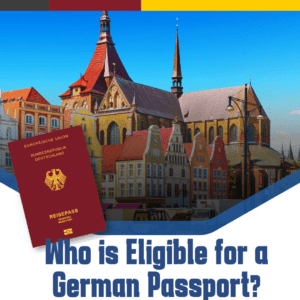Who Is Eligible for a German Passport? (✔️Updated Guide for 2024)
Recent changes in German citizenship law now make it easier for descendants of Holocaust survivors and victims, as well as those who fled Nazi persecution, to acquire German citizenship and a German passport. Who is eligible for a German passport?
Is it easier today to obtain a German passport? Can children obtain German passports? Can spouses of German citizens acquire German passports? What is the cost of obtaining a German passport? And what are the advantages of holding a German passport? Our German immigration attorneys explain it all:
Acquiring German citizenship and a German passport under relaxed conditions
If you have a direct family connection (children/grandchildren/great-grandchildren) to a Jew who was a German citizen \ resident during the 1930s, it is highly likely that you are eligible to obtain German citizenship and a German passport. This is due to the amendment of the German Citizenship Act in 2021, which significantly eased the requirements for granting citizenship to descendants of Nazi victims and their families.
Who qualifies as descendants of Nazi victims under German citizenship law?
Between 1933 and 1945, over 300,000 Jews left Germany in response to the rise of the Nazi regime. During the 1930s, Germany descended politically to the extent that there was no place for Western democratic values such as freedom of expression, equality, or a functioning justice system.
The peak of the eradication of Germany’s democratic identity was the enactment of racial laws, created arbitrarily with the intent to condemn the Jewish religion. As a result, many German Jews began to emigrate in large waves to Israel, Britain, France, the United States, South America, and other countries.
Today, descendants of Holocaust victims, survivors, and Jews who left Germany due to Nazi persecution are entitled to apply for a German passport under the law.
What does eligibility for a German passport mean for Israelis?
Thanks to the recent substantial changes that have significantly lowered the old acceptance threshold, hundreds of thousands of descendants of Nazi victims and Jewish German citizens around the world can now apply for German citizenship, subject to relaxed conditions. These reforms in Germany represent a real breakthrough and a unique opportunity for many Israelis to obtain a European Union passport.
Advantages of a German passport
As a country with one of the strongest economies in Europe and a member of the European Union, Germany offers its citizens a range of unique benefits.
Visa exemption
According to current plans (as of 2025), Israelis will soon need a visa to enter Europe. This requirement will not apply to those who hold German citizenship.
Furthermore, German citizens can enter countries that restrict entry for Israelis without the need for a visa, such as Australia.
Extensive migration options
Another advantage of this attractive passport is the right to live and work in all European Union member states.
Additionally, German citizens are eligible for a working holiday visa, which allows one year of work authorization in countries such as Canada, Japan, Singapore, Australia, New Zealand, and more.
Select social services
If you’re considering living in Germany, you’ll enjoy convenient social services, basic livelihood benefits (subject to compliance with legal requirements), a higher standard of living, advanced healthcare services, subsidized higher education, and more.

Entitlement to a German Passport
If you have a direct family connection to Jews who lived in Germany during the years of the Third Reich in Nazi Germany, between 1933-1945, and were persecuted by the Nazis, it is reasonable to assume that you are entitled to German citizenship.
In light of the easements established by the German government for the naturalization process for victims of the Nazis and their descendants, applicants in this route are not required to meet the requirements that apply to other candidates for German citizenship. These include:
Cancellation of Gender Preference
As part of the easements, the gender preference that had been in place for many decades was abolished. Until not long ago, descendants of female German citizens were eligible for German citizenship only if they were born before 1953. However, starting from June 2021, this restriction has been lifted.
This applies even in cases where the German citizen ancestor married foreigners and lost her German citizenship as a result.
Cancellation of Language and Culture Tests
In addition, the requirements to pass a language test and a test of familiarity with German culture for victims of the Nazis and their descendants have been canceled.
Obtaining a German Passport for Children
Obtaining a German passport for children is relatively straightforward if one of the parents is already a naturalized German citizen. In fact, if one of the parents holds German citizenship, the children do not need to go through the entire process again, making it easier to apply for German citizenship on their behalf.
Parents of children born after receiving German citizenship should schedule an appointment at the German consulate. They should bring the child’s birth certificate along with the German citizenship or passport of the parent to register the child in the German population register so that the child becomes a German citizen.
German Passport for the Spouse of Holocaust Survivors’ Descendants
Unlike the streamlined process for children, the eligibility for citizenship and a passport for a spouse is determined by German law and does not happen automatically. The spouse is required to naturalize through a citizenship application process.
They may be granted citizenship if they have lived in Germany for at least 3 years with their German spouse. This applies to both same-sex and opposite-sex couples, even if they are not married. In cases of common law spouses the law in Germany allows for the registration of the relationship with the official authorities in Germany.
While the spouse does not automatically receive citizenship, German law permits them to immigrate to Germany and all European Union countries as part of the family reunification process.
How to Obtain a German Passport?
To prove eligibility, you must present official documents to the German authorities indicating that these relatives (father/mother, grandparents, etc.) were indeed German citizens. You must also provide documents showing that Germany was the center of their lives during the relevant years.
Based on proof of eligibility, you can submit a formal application for German citizenship. Once you have obtained German citizenship and submit an application for a German passport based on the required documents, translated into German, you can receive a German passport.
Appointment at the German Embassy in Israel
As German citizens residing in Israel, to obtain a German passport, you must schedule an appointment at the German Embassy in Tel Aviv through the embassy’s online system. Due to a high workload at the embassy, securing an appointment may be challenging. Appointment availability fluctuates over time, but in many cases, even approved citizens have difficulty finding available appointments at the embassy. If no available appointments are found for the near future, it is recommended to check the online system during nighttime hours, as updates and new appointments are sometimes released during those times.
Appointment at the German Interior Ministry in Germany
Additionally, you can expedite the process of obtaining a passport by flying to Germany and applying for a passport at the German Interior Ministry. To receive the passport, you will need to fly to Germany and pay a higher fee, but you can complete the passport issuance process in about 7 days.
How Long Does It Take to Get a German Passport?
It is difficult to provide a definitive answer to this question because despite the recent legislative changes that eased the process of obtaining German citizenship, there has been a significant increase in the number of citizenship applications submitted to Germany. However, the capacity of the personnel handling these applications in the German citizenship department remains the same, resulting in delays in processing applications.
As of the writing of this article, the average processing time for citizenship applications ranges from 2 to 3 years, depending on the specific requirements of the German authorities. After obtaining German citizenship and applying for a German passport based on the required documents, the processing time will be faster, typically taking a few months.
Temporary German Passport
Similar to the situation in Israel, Germany also issues a temporary passport in exceptional cases. This passport, known in German as “Reiseausweis als Passersatz,” is usually valid for only one year, after which you will need to apply for a regular passport.
It is crucial to note that a temporary German passport does not grant entry to countries like the United States without a visa, unlike a regular passport.
Cost of Obtaining a German Passport
According to the easements set by the German legislator, there is no need to pay fees for the citizenship application or the naturalization certificate received at the end of the process. Fees for passport applications range from 20 to 100 euros. The cost for processing applications may vary based on individual circumstances, such as the need for archival research to prove citizenship eligibility.
German Electronic ID Card
Adults holding German citizenship can obtain a smart electronic ID card with advanced electronic chips and biometric identification features, provided they are residents of Germany with their center of life in Germany. The issuance of the electronic ID card requires a fee and is processed by the government printing offices in Berlin. The main advantage of the German electronic ID card is that it allows for free travel throughout the European Union territory without the need for a passport.
Professional Assistance for Israelis Seeking a German Passport
In our offices in Jerusalem and Tel Aviv, we have extensive experience assisting applicants who seek to obtain German citizenship and passports. Most descendants of Holocaust survivors who lived in Germany during the 1930s and 1940s, as well as their offspring, can become naturalized and are eligible for a German passport. A German passport grants a range of advantages and benefits in desirable countries throughout Europe and around the world.
If you need further assistance or guidance in the process, please do not hesitate to contact us.
מאמרים מומלצים



